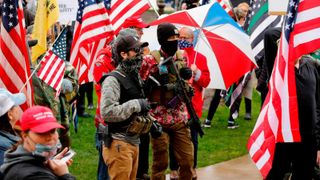The foiled plot by right-wing domestic terrorists to kidnap one of the United States’ most prominent governors should sound an alert for Australia. After months of crises, the tearing apart of America's social fabric is heaving the nation to a dangerous moment. With the arrests of plotters in Michigan, we caught a glimpse of just how emboldened some of these extremists have become. They would gleefully lead the US into civil war.
A pre-eminent expert in the field, Australia's David Kilcullen, points out that the US has met many of the thresholds for an “incipient insurgency”. That is a term usually reserved for discussions about countries outside the world’s leading economies.
And Australia is not immune. As its domestic intelligence agency, ASIO, recently reported, far-right domestic terrorism threats comprise as much as 40 per cent of its case load.
But first to Michigan and the Wolverine Watchmen, a militia group linked to the kidnapping plot. It contains members pining for a much larger insurgency. Some within the fold believe Michigan and the United States have strayed so far from the sacred path charted by the American constitution that they must exercise their Second Amendment rights to bear arms and organise and maintain militias - and inspire others to follow them.
This was the alleged plan: kidnap Democratic Governor Gretchen Whitmer from her holiday home, set off bombs across the county to confuse the response of authorities, imply a breakdown in government and the Michigan legislature, and watch as groups in other states followed suit and sent the country into a civil war.

Why Whitmer? Because she had become the poster child for what they saw as overly harsh lockdowns amid the coronavirus pandemic.
This was not an isolated plot and these groups have already been emboldened. The so-called “Boogaloo” movement, defined by military-grade weapons in the hands of Hawaiian shirt-clad civil war preppers, has used the pandemic to aggressively recruit online. Critically, groups like the Wolverine Watchmen have been afforded an immense amount of power in Michigan already this year.
In late April, as citizens bristled early in the pandemic, armed militia members and a pastiche of conspiracy theorists and genuinely outraged first-time protesters pushed their way past police outside the Michigan State Capitol building and occupied it while the legislature debated stay-at-home orders. The morning after that action, President Donald Trump tweeted that the protesters were “very good people” and that Whitmer should negotiate with them.
A fortnight later, the Michigan legislature cancelled a sitting in the face of another planned occupation. From the perspective of the militia groups, this was a remarkable victory. They had the implied political cover of the President, and they had shut down the government.
While Trump’s office should put him at odds with anti-government extremists and conspiracy theorists, his outsider status has primed a perception of him as their ally inside the citadel. When he should have been condemning the dangerous QAnon conspiracy theorists and the scourge of white supremacy, Trump has at every turn hedged and preserved this perception of himself while maintaining plausible deniability.
Notably, when asked to condemn white supremacists, Trump told them to “stand back and stand by”. In short, he has not created these forces, but he leans into them, and amplifies them, when they challenge his political enemies.
When federal marshals shot a man alleged to have killed a member of a right-wing group, Trump celebrated the shooting, and said ‘‘there has to be retribution’’. When his political allies, such as Roger Stone and Michael Flynn, have broken the law, he and his Attorney-General have rewarded their loyalty by commuting the sentence or dropping the charges.
When he should have been condemning the dangerous QAnon conspiracy theorists and the scourge of white supremacy, Trump has at every turn hedged and preserved this perception of himself while maintaining plausible deniability.
This is a terrifying philosophy of justice from the supposed leader of the free world. When it comes to radicalised extremists and conspiracy theorists, these are not trivial developments. Indeed, Trump's actions imply impunity in exchange for loyalty and retribution for disloyalty.
The net effect is validation of the “silent majority” that is a volatile ingredient in the cocktail of extremism and conspiracy theory. An exemplar acts, others follow. This was the hope of the shooter in the massacre at the Christchurch mosques, an Australian radicalised online.
While clearly not as dangerous, conspiracy theorists have also been mobilised. They sincerely hoped they would change the course of Australian history when they marched in Melbourne against Premier Daniel Andrews and his lockdown. Pre-emptive arrests and the shakedown of protests by a militarised police force merely affirmed their assessment of an overbearing government.
While the situation in the US differs, it would be irresponsible for legislators in Australia to see the plot against Whitmer and these events at home as totally distinct. As ASIO has pointed out, there are more sinister right-wing actors in Australia. As malicious actors see the breakdown of social cohesion in countries such as the US and Australia, they seek opportunities to bolster their ranks.
The onset of the pandemic, declining trust in institutions, the dramatic increase in internet usage and malicious disinformation campaigns have created an environment ripe for these forces to grow in Australia.
So what should Australia’s elected officials see in the Michigan plot?? They should come to the public conclusion that the pandemic has quickened the conditions for the far right and dangerous conspiracy movements to flourish.
And they should arm authorities with every tool needed to deal with these threats, including designating far-right groups on the terrorist register, the virtue of which ASIO is considering.






